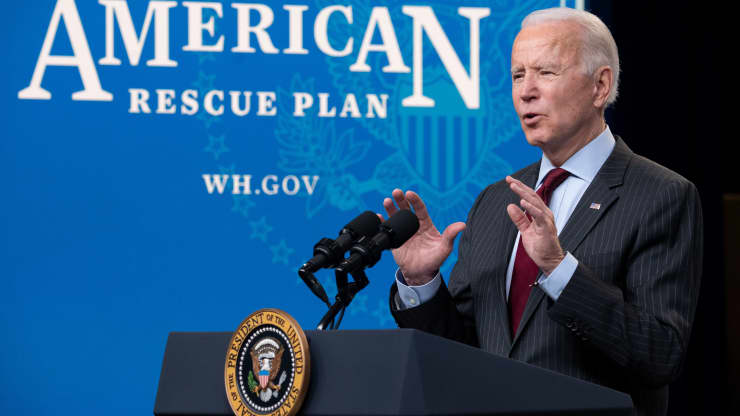- President Biden directed a gender-focused policy council in the White House and other agencies to “launch of a whole-of-government effort” to respond.

The president hopes to sign the bill Friday after Congress formally sends it to the White House, which can take days for large bills. Biden will check off his first major legislative item as the U.S. tries to ramp up Covid-19 vaccinations and jolt the economy.
WASHINGTON — President Biden on Thursday excoriated the Supreme Court’s refusal to block a Texas law that prohibits abortion after six weeks, saying that it “unleashes unconstitutional chaos” against women and vowing that his administration would investigate how the federal government could protect existing constitutional abortion rights.
In a statement, the president said that he had directed a gender-focused policy council in the White House, the Office of the White House Counsel and the Health and Human Services and the Justice Departments to “launch of a whole-of-government effort” to respond to the court’s decision.
“Complete strangers will now be empowered to inject themselves in the most private and personal health decisions faced by women,” Mr. Biden said. “This law is so extreme it does not even allow for exceptions in the case of rape or incest.”
The Texas law, known as S.B. 8, makes it difficult for officials to enforce Roe v. Wade, a landmark decision that establishes the right to abortion until the point of fetal viability, the point at which fetuses can sustain life outside the womb, or about 22 to 24 weeks into a pregnancy.
The law allows anyone to bring a court case against anyone else involved in obtaining an abortion — including taxi drivers, receptionists or relatives who provide money for the procedure — making it difficult for abortion rights activists to challenge its restrictions in court. The law also further incentivizes plaintiffs to police women who are seeking the procedure by offering $10,000, in addition to legal fees, if they win in court.
The law, as Mr. Biden and Vice President Kamala Harris pointed out in statements this week, will disproportionately affect women of color: About 70 percent of abortions in Texas in 2019 were provided to women of color, according to the Guttmacher Institute.
“Patients in Texas will now be forced to travel out of state or carry their pregnancy to term against their will,” Ms. Harris said on Wednesday.
The Supreme Court’s vote to let the law stand was delivered with a 5-to-4 majority late Wednesday evening. In the unsigned majority ruling, justices sought to make clear that the Texas law was still subject to stronger cases against it. But even that, Mr. Biden said, would “allow millions of women in Texas in need of critical reproductive care to suffer while courts sift through procedural complexities.”
Siding with the court’s liberal wing, Chief Justice John G. Roberts Jr. wrote that he would have blocked the law as appeals moved forward.
“The statutory scheme before the court is not only unusual, but unprecedented,” he wrote. “The legislature has imposed a prohibition on abortions after roughly six weeks, and then essentially delegated enforcement of that prohibition to the populace at large. The desired consequence appears to be to insulate the state from responsibility for implementing and enforcing the regulatory regime.”
Biden in a statement Wednesday celebrated the bill’s passage and said he planned to sign it into law Friday.
“This legislation is about giving the backbone of this nation – the essential workers, the working people who built this country, the people who keep this country going – a fighting chance,” he said.
- The House passed Democrats’ $1.9 trillion coronavirus relief bill, Senate approved
- President Joe Biden is expected to sign the legislation before unemployment programs expire on Sunday.
- The plan includes extra unemployment benefits, rental assistance, Covid-19 vaccination funds and direct payments, which are set to start going out this month.
So far, the White House has offered few details on what the president or those in his administration could actually do to defang S.B. 8 or protect Roe v. Wade. In its next term, which starts in October, the Supreme Court will take up a separate case to decide whether it should be overruled.
Jen Psaki, the White House press secretary, said Wednesday that the president would “continue to call for the codification of Roe,” adding that the Texas law “highlights even further the need to move forward on that effort.”
On Thursday, she said administration officials were concerned that other states would quickly follow Texas’ lead and pass similar bills.
“Of course we’re worried that other states, where there is a movement and an effort to prevent women from having access to health care, will copycat what’s happened in Texas,” she said. Officials in Florida and Arkansas have already said they intend to introduce measures similar to the Texas law.
Other Democrats vowed to take up measures to protect abortion rights. Speaker Nancy Pelosi said in a statement that S.B. 8 “delivers catastrophe to women in Texas” and added that when lawmakers returned from their summer recess, the House would take up the Women’s Health Protection Act, which would provide new protections for abortion access. That measure is unlikely to garner the 60 votes needed to overcome a potential filibuster and be considered in the Senate.

The House plans to pass Democrats’ $1.9 trillion coronavirus relief bill this week and get fresh aid to Americans starting this month.
The chamber aims to approve the rescue package in time for President Joe Biden to sign it before key unemployment programs expire on Sunday. The Senate passed the legislation on Saturday.
Democratic leaders hope to get the legislation through the House as soon as Tuesday, but passage could slip to Wednesday as representatives wait for the Senate to send the massive proposal back across the Capitol.
“It could be that we get it tomorrow afternoon and then it has to go to [the House Rules Committee]. And we’d take it up Wednesday morning at the latest,” House Speaker Nancy Pelosi, D-Calif., told reporters Monday.
The bill extends a $300 per week boost to unemployment benefits through Sept. 6 and sends direct payments of up to $1,400 to most Americans. The stimulus money will start hitting accounts this month, Biden said Saturday.
The bill also includes an expansion of the child tax credit, rental payment assistance and funds for Covid-19 vaccine distribution and testing. It directs money to state, local and tribal governments, along with schools.
Democrats passed the bill in the evenly split Senate without Republican support through the budget reconciliation process. They are not expected to win any votes from House Republicans, as the GOP criticizes what it calls wasteful spending in the bill.
When the House passed a different version of the plan last month, no Republicans supported it and two Democrats opposed it. Despite the lack of GOP votes the first time around, Pelosi is holding out hope for Republican support.
“The House now hopes to have a bipartisan vote on this life-saving legislation and urges Republicans to join us in recognition of the devastating reality of this vicious virus and economic crisis and of the need for decisive action,” she said in a statement Saturday.
While changes made to appease conservative Democratic Sen. Joe Manchin of West Virginia drew criticism from House progressives, the bill appears set to pass the House on Tuesday. The Senate bill limited the number of people receiving direct payments relative to the House plan by capping them at $80,000 in income for individuals and $160,000 for joint filers.
It also reduced the jobless benefit supplement to $300 from $400 in the House bill. The policy will last an additional week, through Sept. 6.
After the Senate passed the changes, House progressives signaled they would vote for the revised plan.
“Importantly, despite the fact that we believe any weakening of the House provisions were bad policy and bad politics, the reality is that the final amendments were relatively minor concessions,” Congressional Progressive Caucus Chair Rep. Pramila Jayapal, D-Wash., said in a statement Saturday. “The American Rescue Plan has retained its core bold, progressive elements originally proposed by President Joe Biden and passed in the House relief package.”
Republicans criticized Democrats for pursuing the relief package on their own. The GOP also targeted what it called wasteful spending not needed to end the pandemic and boost the economic recovery.
Senate Minority Leader Mitch McConnell, R-Ky., argued Democrats wanted to push through “unrelated policy changes that they couldn’t pass honestly.”
McConnell also pointed to a better-than-expected February jobs report as evidence that nearly $2 trillion in spending is unnecessary.
Biden and Democrats have said the country needs the stimulus spending to sustain economic gains and help the millions of people still receiving unemployment benefits or unable to afford food and rent.




















